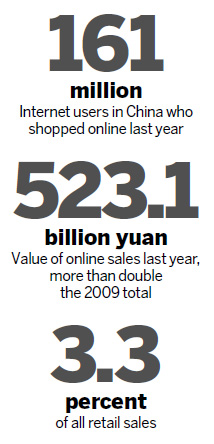Technology
A taxing issue for online shops
Updated: 2011-07-12 09:27
By Yang Wanli and Chen Limin (China Daily)
Real names, IDs
The regulations issued as "interim measures" last year by the State Administration for Industry& Commerce require online sellers to provide their real names and identification numbers to the shopping platforms where they open their online stores. Previously, some sellers registered with any name they wanted, and ID numbers were not required.
Online stores meeting the requirements to register as companies with their local industry and commerce bureaus - a preliminary to being taxed - are to do so.
 |
An official from the administration said it will begin nationwide survey of Internet shops this year that aims to collect information on the number and sales of e-commerce shops. The data, to be collected over about three years, will contribute to standardized management of the industry in the future, the administration said.
"We are closely following what's happening, but we have not been told of anything related to taxing online sellers," said Yang Sha, public relations manager of Paipai.com, ashopping website under Internet conglomerate TencentHoldings Ltd.
Taobao.com handled more than two-thirds of China's online shopping last year, with 400 billion yuan in transactions. Its public relations manager, Yan Qiao, said there are two kinds of online stores on Taobao - those registered as companies and those that are not.
Taxing a company or not "depends on whether it's aregistered company, not whether it is an online shop", Yansaid.
He declined to comment on whether the government should tax online stores, but said that registered companies should pay tax.
Liu, the tax law specialist, thinks that the regulations are the first step toward future taxing of online sales. "Following the providing of real personal information about online sellers,registering in the department of industry and commerce will be the next," he said.
"It is a good thing to consumers because all these actions will contribute a lot to cleaning the market. A short-term hurt is unavoidable, but greater service and high-quality products will come later."
The State Administration of Taxation didn't reply to China Daily's request for an interview about taxation of online shop owners.
'It will be death'
Yu Kai, 40-year-old boss of an online store based in Wuhan, foresees more than "a short-termhurt". If the government taxed Internet sales, he said, it would kill his business. "It will be the death of almost all Net stores."
Yu's company has sold auto parts on Taobao since Aug 1, 2008, and has racked up more than100,000 transactions. "But we earned little." His eight employees average 1,500 to 3,000 yuana month in wages, he said.
"The greatest advantage of online shops is providing customers with lower prices" than bricks-and-mortar stores, he said. To draw traffic, he sells some items below cost. "If we have to paytax, there will be no profits."
"If Wuhan starts to collect tax," he said, "I would choose to change my ID and register in other cities."
Support first
Lu Benfu, an expert on the Internet economy at the School of Management, Chinese Academy of Sciences, said taxes on Internet sales should be collected at some point, but determining how and when that is done is an art.
"The government should first of all support the industry for some time before taxing it, which may well be a burden for online sellers." And he thinks exemptions should be allowed under three circumstances: on all online sellers until their number exceeds 5 million; on those whosesales account for less than 5 percent of total retail sales in China; and on those whose average annual income is less than 50,000 yuan.
The government has encouraged people and companies to conduct commerce online, andmany experts say e-commerce will stimulate domestic consumption.
Guangdong, Zhejiang and Sichuan provinces, as well as some other areas, have adopted a series of favorable policies for e-commerce, including tax return, rent deductions and free training.
"If the government were to tax online sellers now, it could reduce their passion for taking part ine-commerce business," said Chen Shousong, an analyst with domestic research companyAnalysys International. He also thinks taxes should be levied differently for goods sold onlineand traditionally so as not to squelch the motivation of e-sellers.
Xu Xiaolan, deputy director at the China Center for Information Industry Development, said the government could test online taxation in certain cities before putting it into practice nationwide.
VAT elsewhere
Lawyer Liu explained that the VAT system in China has two rates, for large-scale and small-scale shops. The value-added tax for shops with transactions of more than 1.8 million yuan($278,000) is 17 percent of the added value (the selling price minus purchase price). For those with lower transaction totals, the tax is 3 percent of the selling price.
In the United Kingdom, Liu said, e-commerce regulations took effect in August 2002. Theyprovide for a standard VAT rate of 17.5 percent, a preferential rate of 5 percent and a rate ofzero, depending on the types of products. Stores with less than $92,000 in transactions are not required to pay the tax.
In Germany, the price of products sold online includes the VAT. The rate for most products is 19percent, but for books, it is only 7 percent to encourage people to read more.

Specials

90th anniversary of the CPC
The Party has been leading the country and people to prosperity.

The write stuff
'Pen capital' goes back to drawing board for answers to economic changes taking shape in Zhejiang

Say hello to hi panda
An unusual panda is the rising star in Europe's fashion circles